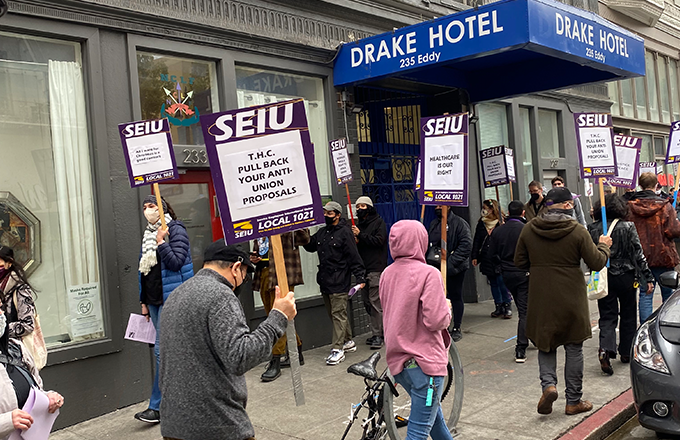
SF nonprofit workers fight for increased funding for services and pay parity for their work
As many of San Francisco’s nonprofit union workers get set to bargain new contracts this year, a unifying problem is emerging across employers and worksites—we need a greater investment in services provided, and we need pay parity between nonprofit and public workers providing similar services.
The short-staffing crisis facing many of Northern California’s municipalities has been in the headlines a ton over recent months, as thousands of San Francisco City workers have campaigned to fill the vacancies which have been crippling public services. Those same problems apply in the nonprofit sector, where already-high vacancy and turnover rates are exacerbated by low pay.
As a result, workers at the Tenderloin Housing Clinic have engaged in a number of informational pickets outside of their offices over recent weeks and months.
“The supportive housing system, as it’s currently designed, is not working,” Evan Oravec, an organizer for Tenderloin Housing Clinic, told the San Francisco Standard recently. “We’ve seen the effect of low wages…it’s hard to keep the buildings running, and so we’re [asking] for this system to truly uphold its values and stabilize and support people.”
“It’s hard to go beyond crisis management when you have such heavy caseloads,” Marissa Roarty, a Clinical Case Manager with the Tenderloin Housing Clinic who has had her life threatened at work in the past, told the San Francisco Chronicle in a recent story that dives into the city’s supportive housing system. “You’re putting on a Band-Aid rather than getting to the root of the issue.”
Workers at HomeRise, another supportive housing nonprofit, tell a similar story. “Because of the pay, the turnover is just ridiculous. People don’t stay for more than six months,” Mia Robinson, a desk clerk, told KQED last week.
In 2021, SEIU Local 1021 compared the salaries of nonprofits that the union represents with compensation of equivalent city positions and found that nonprofit workers on average made 45 percent less than city workers performing similar jobs. As a result, many workers get hired by nonprofits in order to gain some job experience before departing for better pay and working conditions in city or county jobs.
Historically, many cities have awarded contracts with nonprofits that could drive down the cost of providing services by paying people the lowest wages possible. We cannot let nonprofits drive down wages and labor standards. Nonprofit workers need a union and a voice at work to fight for increased funding which can be used to raise pay and address recruitment and retention issues, while simultaneously removing the cost incentive for city leaders to outsource this work.
For more information and background about the challenges facing union nonprofits in San Francisco, check out this article published last year by Mission Local.

